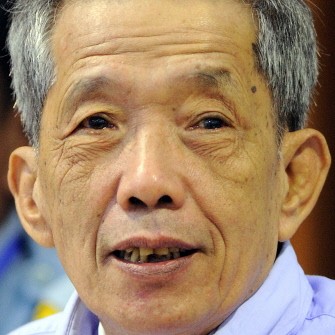
PHNOM PENH, March 26, 2011 (AFP) - Cambodia's war crimes court will hear appeals next week in the case of of former Khmer Rouge cadre Duch, who is seeking acquittal despite admitting running a feared jail where thousands died.
Duch, 68, was sentenced to 35 years in prison last July for war crimes and crimes against humanity for overseeing the deaths of 15,000 people at the notorious torture prison Tuol Sleng in the late 1970s.
The jailer, whose real name is Kaing Guek Eav, was the first former Khmer Rouge cadre to face an international tribunal.
His sentence was reduced to 30 years on the grounds that he had been detained illegally for years. And given time already served, Duch could walk free in less than 19 years, much to the dismay of many victims of the brutal 1975-1979 regime.
Prosecutors are also appealing, hoping to have Duch's sentence increased to life, to be commuted to 45 years for time served in unlawful detention.
During his trial, Duch repeatedly apologised for overseeing mass murder at the detention centre, also known as S-21, but shocked the court by asking to be acquitted in his closing statement in November 2009.
The defence team will claim in their appeal on Monday that the UN-backed court has no jurisdiction over Duch because he was not one of the regime's senior leaders nor one of those most responsible for the crimes committed.
"The court is not allowed to try a person that does not fall into one of those two groups", Kang Ritheary, one of Duch's lawyers, told AFP, adding that Duch was only following orders.
"He had to try his best at work in order to save his life."
Anne Heindel, a legal adviser at the Documentation Centre of Cambodia, which collects evidence of Khmer Rouge atrocities, said the defence strategy was "reckless" because the court "has wide discretion in determining whom to prosecute".
"Instead of responding to the prosecution's multiple arguments for a longer sentence, the defence keeps reiterating this one untimely and uncompelling argument," Heindel said.
Prosecutors say in their appeal brief that the verdict did "not adequately reflect the seriousness of the crimes or the respondent's role in those crimes".
They also want enslavement, imprisonment, torture, extermination and other inhumane acts to be added to Duch's list of convictions.
The tribunal's Supreme Court Chamber is expected to announce its ruling on the appeals in late June.
Chum Mey, 80, one of the few survivors of S-21, said "there would be no justice" if Duch is released and he should be jailed for life.
Led by "Brother Number One" Pol Pot, who died in 1998, the Khmer Rouge wiped out nearly a quarter of Cambodia's population through starvation, overwork and execution.
S-21, in Phnom Penh, was at the centre of the regime's security apparatus and thousands of inmates were taken from there for execution in a nearby orchard.
Duch has been detained since 1999, when he was found working as a Christian aid worker in the jungle. He was formally arrested by the tribunal in July 2007.
Four of the regime's most senior surviving members are due to go on trial later this year and Duch is expected to appear as a witness.
The tribunal, dogged by allegations of political interference, has yet to announce whether it will pursue two more cases against five more former Khmer Rouge cadres.
Cambodian Prime Minister Hun Sen, himself a mid-level cadre before he turned against the movement, said late last year no new trials would be allowed.
But observers say Duch's court proceedings were free from political pressure, even though one of his lawyers has also acted for the premier.
























